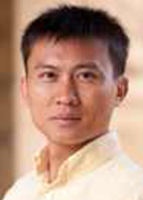Time: 16th January, 2018, 10:30 am
Venue: The Academic Report Hall of Department of Biotechnology
Lecturer: CUI Yi Stanford University

Abstract:
Nanotechnology has provided a novel technology platform which can address critical energy and environmental problems and enable new opportunities. In the past decade, my group has conducted research on innovative ideas to address problems related to energy conversion, storage and saving, and environment (air, water and soil) cleaning, to create new opportunities in wearable applications. Here I will show exciting examples, including: 1) high energy battery materials including Si and Li metal anodes and S cathodes; 2) electrochemical tuning of catalysts; 3) Water disinfection using conducting nanofilters and uranium extraction for seawater. 4) Nanofiber air filters for efficient PM2.5 removal and low air resistance. 5) Cooling and heating textile for personal thermal management. Nanotechnology represents the most important foundational technology platform to impact nearly all areas of applications.
Introduction:
CUI Yi is a Professor in the Department of Materials Science and Engineering at Stanford University. He received B.S. in Chemistry in 1998 at the University of Science and Technology of China (USTC), Ph.D in 2002 at Harvard University. After that, he went on to work as a Miller Postdoctoral Fellow at University of California, Berkeley. In 2005 he became an Assistant Professor in the Department of Materials Science and Engineering at Stanford University. In 2010 he was promoted with tenure. His current research is on nanomaterials for energy storage, photovotalics, topological insulators, biology and environment.
He is a fellow of Materials Research Society and a fellow of Royal Society of Chemistry. He is an Associate Editor of Nano Letters. He is a Co-Director of the Bay Area Photovoltaics Consortium and a Co-Director of Battery 500 Consortium. He is a highly proliferate materials scientist and has published ~380 research papers, filed more than 40 patent applications and give ~330 plenary/keynote/invited talks. In 2014, he was ranked NO.1 in Materials Science by Thomson Reuters as “The World’s Most Influential Scientific Minds”. He has won numerous awards recognizing his scientific contributions in these research areas, including Blavatnik National Laureate (2017), MRS Fred Kavli Distinguished Lectureship in Nanoscience (2015), Small Young Innovator Award (2015), Resonate Award for Sustainability (2015), Blavatnik National Award Finalist (2015), Inorganic Chemistry Frontiers Award for Young Scientist (2015), Inaugural Schlumberger Chemistry Lectureship (University of Cambridge, 2015), Closs Lectureship (University of Chicago, 2014), Inaugural Nano Energy Award (2014), Bau Family Awards in Inorganic Chemistry (2014), the IUPAC Distinguished Award for Novel Materials and Synthesis (2013), the Wilson Prize (2011), the David Filo and Jerry Yang Faculty Scholar (2010), the Sloan Research Fellowship (2010), KAUST Investigator Award (2008), ONR Young Investigator Award (2008), MDV Innovators Award (2007), Terman Fellowship (2005), the Technology Review World Top Young Innovator Award (2004).
He founded Amprius Inc. in 2008, a company to commercialize the high-energy battery technology. Now the high-energy batteries invented by him have started to be used in commercial market, which could potentially revolutionize portable electronics and transportation applications. In 2015, he and Professor Steve Chu co-founded 4C Air Inc., to commercialize their invented breakthrough technology to remove particle pollutants from the air. In 2017, he co-founded EEnovate Technology Inc., to commercialize his multiple inventions all together.
Contact: LI Xianfeng, LIU Huijuan